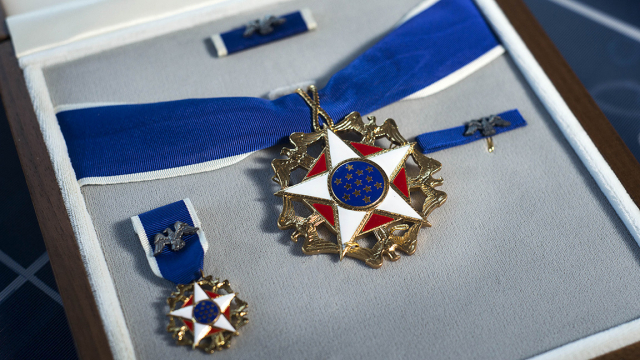 When Bob Dylan was awarded the Presidential Medal of Freedom in May 2012 by then-President Barack Obama, Elizabethtown College Professor of Political Science Fletcher McClellan wondered about the politics behind this medals’ practice.
When Bob Dylan was awarded the Presidential Medal of Freedom in May 2012 by then-President Barack Obama, Elizabethtown College Professor of Political Science Fletcher McClellan wondered about the politics behind this medals’ practice.
He shared his research idea with Kyle Kopko, assistant dean for academic achievement and engagement and associate professor of political science, and, after spending a summer developing research questions, they approached senior students Jillian Casey ’13 and Julia Ward ’13 about assisting with research. They were seniors at the time.
According to Kopko, Casey and Ward worked closely with him, McClellan and Christopher Devine, assistant professor of political science at the University of Dayton. Their primary job, he said, was to gather and code data. The students created a database of each recipient, categorized them as Republican or Democrat and classified the field of the recipient.
While the analysis of data fell mainly to Devine, Kopko and McClellan, the writing of the paper was splint among all five participants.
Much of their findings, McClellan said, were consistent with expectations. Democratic presidents gave more awards to civil rights leaders or labor leaders, while Republicans gave more awards to military leaders. Though they had thought gender differences might arise, they discovered Republican and Democratic presidents were equally likely to hand awards to women.
Also it was found that, since its beginning in the Johnson administration, the ceremonies for the Medal of Freedom have been made into large scale events garnering national attention from the press. According to Kopko, this change could indicate a president’s attempt to shift public opinion and to influence their legacy by choosing with whom they permanently want to be associated.
The awarding of these medals are unique in that the decisions are made by the president and, maybe, a few senior aides, McClellan said. “These are people that presidents admire.”
Ward and Casey became involved with the project because they had a previously existing working relationship with one or both of the professors. Prior to her involvement in the research, Ward said, the Presidential Medal of Freedom was not an area of interest. “It’s a pretty niche area of politics.”
“I think this was one of the greatest things about E-town. [There are] so many opportunities to develop relationships with faculty and do research with them,” Casey added. “You don’t get the same opportunities at larger schools because you don’t have the ability to develop such a close relationship … .”
Ward agreed and urged students to take advantage of similar opportunities. “The best part about partnering with faculty is the relationship you build,” she said. “There is a dynamic change where you become colleagues. You’re working together on a project.”
The research team’s findings were presented in January 2013 at the Southern Political Science Association in Orlando, Fla. Ward and Casey had an active role in presenting. After receiving good feedback, they published the paper. It took some time, but eventually the New England Journal of Political Science picked up the piece.
According to Kopko, they originally thought the project would be used by scholars or as a reference item for reporters seeking more information on the topic. “Over the years since it was published – just two years now – it’s gotten publicity in the New York Times, U.S. News & World Report and the Washington Post,” he said.
“The media is picking up more on political science research,” said McClellan. “There are a lot of outlets that are using political science research to inform the debate or understand and analyze what’s going on.”
Ward and Casey went on to receive Fulbright Scholarships; Casey pursued her master’s degrees.
Both agree that working on this project helped to build important skills for graduate and law school. In May, Ward and Casey will both graduate from Georgetown University Law Center. The paper has been a common conversation topic at job interviews, Ward said.
Kopko intends to keep the project going. “Whenever there’s a ceremony announced we’ll add to the database and, periodically, write an op-ed or something of that nature,” he said.
“It will be interesting… [to see] what kind of causes [and] what kind of American heroes [President Donald Trump will] want to associate himself and his administration with,” McClellan said.

